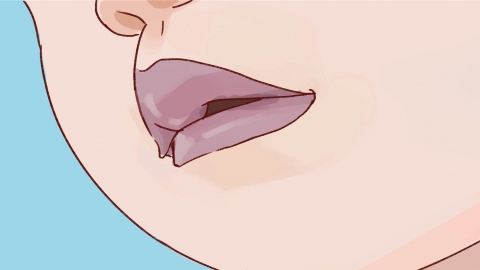What disease causes purple lips?
Generally speaking, there is no specific disease associated with purple lips. Purple lips may be caused by emotional fluctuations or cold exposure, or may be due to conditions such as acute bronchitis, anemia, or chronic obstructive pulmonary disease (COPD). If discomfort occurs, timely medical attention is recommended. Detailed explanations are as follows:

1. Emotional Fluctuations
Significant emotional fluctuations, such as tension, anxiety, or anger, may lead to increased secretion of hormones like adrenaline in the body, which can cause vasoconstriction and insufficient blood supply to the lips, resulting in purple lips. It is important to learn emotional regulation, maintain a calm mindset, and avoid excessive tension and anxiety.
2. Cold Exposure
In cold environments, lip blood vessels may constrict due to cold stimulation, leading to reduced local blood flow and tissue hypoxia, which causes temporary purpling of the lips. It is important to stay warm, avoid prolonged exposure to cold environments, and protect the lips by wearing masks or scarves.
3. Acute Bronchitis
Acute bronchitis is usually caused by viral or bacterial infections. Inflammation leads to increased airway secretions, which hinders gas exchange, causing hypoxia and resulting in purple lips. Symptoms may include coughing, sputum production, and chest tightness. Patients may use medications such as Lianhua Qingwen Capsules, Ji Zhi Syrup, or Chuanbei枇杷膏(Pipay膏) according to medical advice, and ensure adequate rest while maintaining indoor air humidity.
4. Anemia
Anemia is generally caused by a decrease in red blood cell count or reduced hemoglobin levels. Anemia leads to decreased oxygen-carrying capacity of blood, causing tissue hypoxia and purple lips. Accompanying symptoms may include fatigue, dizziness, and palpitations. Patients may take medications such as Guipi Pills, Ejiao Blood-enriching Oral Liquid, or Compound Ejiao Syrup under medical guidance, while adjusting their diet to increase iron intake.
5. Chronic Obstructive Pulmonary Disease
Chronic obstructive pulmonary disease is mainly caused by long-term smoking, air pollution, and other factors leading to narrowing of the airways and airflow limitation. This disease impairs the lungs' ability to ventilate and exchange gases, causing systemic hypoxia and the above symptoms. Symptoms may include coughing, sputum production, and shortness of breath. Patients may use medications such as Beclomethasone Dipropionate Inhalation Aerosol, Budesonide Inhalation Aerosol, or Doxofylline Tablets according to medical instructions.
In daily life, maintaining good habits, avoiding excessive fatigue and staying up late, and enhancing immunity are important. Additionally, reduce exposure to cold, quit smoking, avoid secondhand smoke, and refrain from consuming spoiled or pickled foods.










